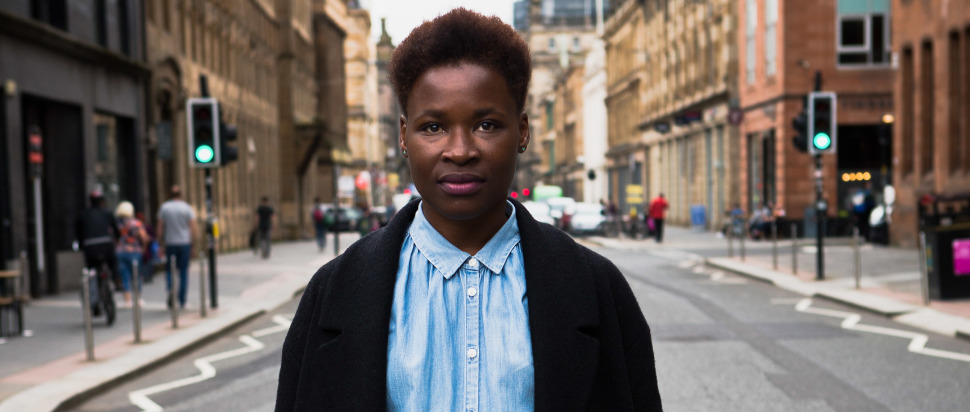Not Your Usual: Adura Onashile on her path to filmmaking
Not Your Usual is a new series from The Skinny and Glayva highlighting innovative artists from across the Scottish scene. For our fourth instalment, we chat to actor-writer-director Adura Onashile over a warming Gallavant glocktail

How does one become an award-winning actor and director across theatre and film? According to Glasgow-based actor-writer-director Adura Onashile, mostly by happenstance. She can’t remember ever having a burning desire to be on stage growing up. “I just really liked stories, I liked language,” she recalls. “And those were the subjects I did well in. I just fell into it.”
Chance also brought Onashile to Glasgow. She arrived in the city for the first time in 2010, to begin rehearsing for what would become her breakthrough acting role in Steff Smith’s bruising human trafficking play Roadkill, directed by Cora Bissett. “I remember the journey from Central Station to Dennistoun in the back of a cab, and I was just immediately overwhelmed by how beautiful the architecture of the city was,” she recalls. The people weren’t bad either. “Glasgow felt like it was an art scene that was really accessible and open, which felt like quite a contrast to what I was used to in London.” Roadkill went on to be a smash, winning every major theatre award at that year’s Fringe. By then, Onashile had decided to make Scotland her home.
She returned to the Fringe in 2013 with her self-penned solo show HeLa, based on the story of Henrietta Lacks, an African-American woman whose cancer cells were used to create the HeLa cell line, which has been hugely important in medical research ever since. “HeLa was such a great experience,” says Onashile. “Writing a character for myself to play, that challenge made me grow as an artist. So after that, I really wanted to write.”
And write she did. In 2016, Onashile stormed the Fringe with Expensive Shit. “To be honest, I thought I had just one chance,” says Onashile, “so I threw everything at this play.” She’s not exaggerating. Expensive Shit, which Onashile also directed, explores parallel moral dilemmas taking place in two nightclub toilets: one in modern-day Glasgow, the other in Fela Kuti’s Shrine Club in Lagos in the 70s. The Glasgow portion was inspired by the story of the Shimmy Club, a garish nightclub that installed a two-way mirror in the women’s toilets, the other side of which was a private room where the women could be observed without their knowledge. In a cinematic fashion, the play's action switches back and forth between timelines.
Onashile reckons she only came up with an idea this ambitious because she didn’t know any better. “I think my ignorance of playwriting actually allowed me to take those risks,” she suggests. “If I’d been trained, maybe I would have been much more cautious about being so dynamic with the shifts in time and place.” This freedom to experiment was important though. “It’s influenced my work ever since because I like trying things out that maybe don't necessarily make sense, but sometimes in that challenge, you find beauty.”
Expensive Shit caught the eye of Rosie Crerar and Ciara Barry, film producers based in Glasgow. “[Rosie and Ciara] got in touch with me and said, ‘You write with this very visual style. We think you might be able to write for film.’” Once again, chance was taking Onashile down a path she hadn’t considered before. “I was very excited to try [filmmaking] out, but I never thought anything would come of it.”
She was immediately taken with the idea of reworking Expensive Shit cinematically. “While adapting Expensive Shit, I learned a lot about screenwriting and directing,” she says. “I loved every minute of turning the play into a short and then shooting the film, editing that film and putting it out there. It was a great experience.”
The 70s-set scenes at the Shrine Club were stripped back to concentrate on the contemporary tale set in Glasgow clubland dealing with race, class, immigration and exploitation. The resulting short plays like a real-time thriller and was particularly well received at the Glasgow Short Film Festival, where it was awarded Best Scottish Short by both the festival jury and the audience.
The propulsive Expensive Shit doesn’t quite prepare you for Girl, Onashile’s much quieter, more intimate feature debut. Also set in Glasgow, it tells the story of Grace, a Black immigrant single mother, and her complex, co-dependent relationship with her ten-year-old daughter, Ama. The film isn’t autobiographical, but it does take influence from Onashile’s childhood.
“I've always been fascinated by how lines can be blurred when you have a young single mother and a young daughter,” she explains. “That's how I grew up. I'm the only child of a single mother and lines often blurred. Are we sisters? Are we best friends? Are we mother and daughter? I wanted to push that to the extreme in Girl.”
Grace is a troubled young woman, and she’s carrying a deep trauma from before Ama was born, which is slowly revealed throughout the film in striking flashbacks to her youth. What distinguishes Girl from similarly themed British dramas is that for all the misery Grace has endured, there is colour and life in the film too. “When I see working-class black lives portrayed on screen, it can often feel like it doesn't have much beauty in it,” says Onashile. “Especially if you're dealing with traumatic situations. And I don't think that's reality – or it doesn't always have to be. I think beauty and love can sit next to trauma quite closely.”
Girl is released 24 Nov by Studio Soho Distribution, with a preview screening at Glasgow Film Theatre on 17 Nov followed by a Q&A
This interview was conducted over The Gallivant, a Glocktail made with Glayva, Scotch whisky, sweet vermouth and Angostura Bitters, stirred in a martini glass with no ice and garnished with blackberries.
